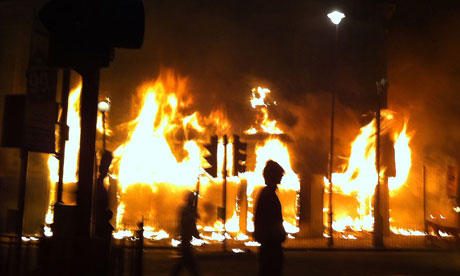The shooting of Mark Duggan must be investigated openly
The IPCC says sensitive evidence of police decision-making may prevent an open hearing. What are the police trying to hide?
'The victims of the rioting deserve answers too. Otherwise, how can we ensure that this will never happen again?' Photograph: Matthew Lloyd/Getty Images
The news that the inquest into the shooting of Mark Duggan has been further delayed, from September 2012 to January 2013, comes as no great surprise to those of us who have been through these types of investigations. Delays became par for the course in the inquests into the deaths of Cynthia Jarrett and Joy Gardner. It took four years for Roger Sylvester, another Tottenham resident whose life ended in police custody, to be declared "unlawfully killed", a verdict that was quashed a year later. And the inquest into the 2005 shooting of Azelle Rodney by Metropolitan police officers is still to be heard.
What was surprising in this case, shocking even, was the revelation from the Independent Police Complaints Commission that, in investigating the shooting, it has unearthed such sensitive material over police decision-making that it is unable to reveal it, even to the inquest coroner. So there is now a real possibility that an open inquest may not be held at all. Instead there may have to be an inquiry, before a judge, that would allow for closed sessions in which these "sensitive details" are kept secret.
As a former member of the IPCC's community reference group, which had limited oversight of the investigation – and before that an independent adviser to the police gun crime unit Operation Trident – I have a working knowledge of police operational procedures and cannot think of any reason why their decision-making processes should not be held up to public scrutiny. Of course there are the few exceptions where national security may genuinely be at stake, but Duggan's death, regardless of the aftermath, isn't on a par with them. I know of no case other than that of David Kelly, the United Nations weapons inspector who committed suicide in 2003, in which "sensitive information" has been used to prevent an inquest in which all evidence can be interrogated in full public glare. What can be so sensitive in Duggan's case?
Given the rioting that started in Tottenham and quickly spread across the country following his death, the police and the IPCC should be doing their utmost to ensure that all relevant information on this planned operation would be held up for public scrutiny. However, if the IPCC has its way we will be left with many unanswered questions – questions to which Duggan's children, his parents and loved ones deserve answers.
The police and IPCC have already been forced to acknowledge that they failed Tottenham. On 6 August last year I led a demonstration to the police station as we wanted to know why Duggan's parents had not been informed of the circumstances of his death. Last month the Metropolitan police and the IPCC, quite rightly, publicly apologised to his parents. Had they treated the parents with the dignity and respect from the start we would never have gone to the police station. Had the IPCC not misled the media about an apparent shootout, we wouldn't have gone there angry.
As a result the IPCC's credibility in Tottenham is absolutely blown, which is in itself almost a criminal act because we needed to believe in this organisation. We needed to believe that a robust and transparent investigation into this tragedy would take place and that the lessons would be learned. But it's difficult, if not impossible, to have faith when the facts are kept secret, behind closed doors.
One of the things that the IPCC pledged to learn from last August was the dangers of what can happen when there is an information vacuum. The answer is that it's quickly filled. In August 2011 the word on the streets was that "they executed Mark". Seven months later the word is that the police had control of the gun or worse. If true, then the police are more than culpable in Duggan's killing: in the parlance of the modern judicial system they are guilty of joint enterprise. Is that what they are trying to hide from the world? We need an open inquest so we can learn the truth.
• Follow Comment is free on Twitter @commentisfree
http://www.guardian.co.uk/commentisfree/2012/mar/27/shooting-mark-duggan-ipcc-open-hearing?CMP=twt_gu

